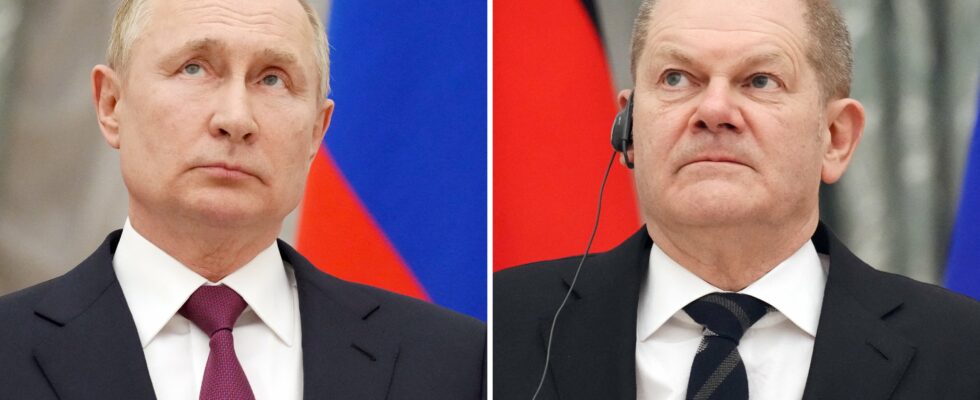They hadn’t spoken in two years. German Chancellor Olaf Scholz had a telephone conversation with Vladimir Putin this Friday, November 15, during which he urged the Russian president to withdraw his troops from Ukraine and negotiate with kyiv.
During this exchange which lasted an hour, according to Berlin, the chancellor asked Russia to demonstrate “willingness to begin negotiations with Ukraine with a view to a just and lasting peace” and underlined “the “the EU’s unwavering commitment to Ukraine,” according to a German government statement.
“Potential agreements must take into account the interests of the Russian Federation regarding security, be based on new territorial realities and, above all, address the root causes of the conflict,” said a Kremlin press release, referring to a “frank” exchange between Vladimir Putin and Olaf Scholz.
The chancellery specifies that Olaf Scholz had previously spoken with Ukrainian President Volodymyr Zelensky and that it “will also do so following the meeting with the Russian president.” The German Chancellor also reiterated to Vladimir Putin “Germany’s determination to support Ukraine for as long as necessary in its defensive struggle against Russian aggression.”
The last call between the German and Russian leaders dates back to December 2, 2022, some 9 months after the start of the offensive of Moscow’s troops in Ukraine on February 24, 2022.
Since the Russian invasion, Germany, Russia’s historic energy partner, has been the second largest supplier of military aid to kyiv, after the United States, Moscow’s hated rival. But in recent months, and despite repeated requests from Volodymyr Zelensky, Chancellor Scholz has tirelessly refused to provide kyiv with long-range Taurus missiles – which kyiv considers effective in better defending against daily Russian missile and drone attacks -, fearing an escalation with Moscow.
The return of diplomacy?
This refusal, like Olaf Scholz’s rejection of kyiv’s request for an invitation to NATO, damaged the image of the German leader in Ukraine. These tensions, exacerbated by the Ukrainian difficulties on the front facing a more powerful Russian army which is advancing in the Donbass (east), also occur in an uncertain global geopolitical context, since the election of Donald Trump to the White House.
The former and future American president has promised in recent months to resolve the Ukrainian conflict “in twenty-four hours”, without ever detailing his plan, and his victory has made Ukrainians fear that American support for their country will fade.
For his part, Olaf Scholz, in difficulty domestically, called for redoubled efforts to end the conflict through diplomacy, including by discussing with Vladimir Putin, in consultation with kyiv and this country’s allies. . In mid-October, he judged that the time had come “to do everything – in addition to clearly supporting Ukraine – to find a way to prevent this war from continuing”. These discussions should respect “clear principles”, he stressed: “there will never be decisions taken over Ukraine’s head, and never without consultation with our closest partners”, had -he said.
The key to stopping this war, which has lasted for more than three years, could indeed be found in Europe. According to exclusive information from L’Express, emissaries meet regularly in the greatest secrecy, a few kilometers from Geneva, in Switzerland, with the aim of bringing Russians, Ukrainians, Americans and Europeans to the table. “These are informal meetings with experts, sometimes officials, when we reach sufficient maturity in the dialogue,” explains Thomas Greminger, former secretary general of the Organization for Security and Cooperation in Europe, and today at the head of the Geneva Center for Security Policy, the Swiss organization which oversees these meetings. In this thrilling closed session, the red lines of the two camps are discussed, the terms of a possible ceasefire, security guarantees for Ukraine and future relations with Moscow.
